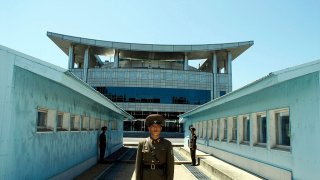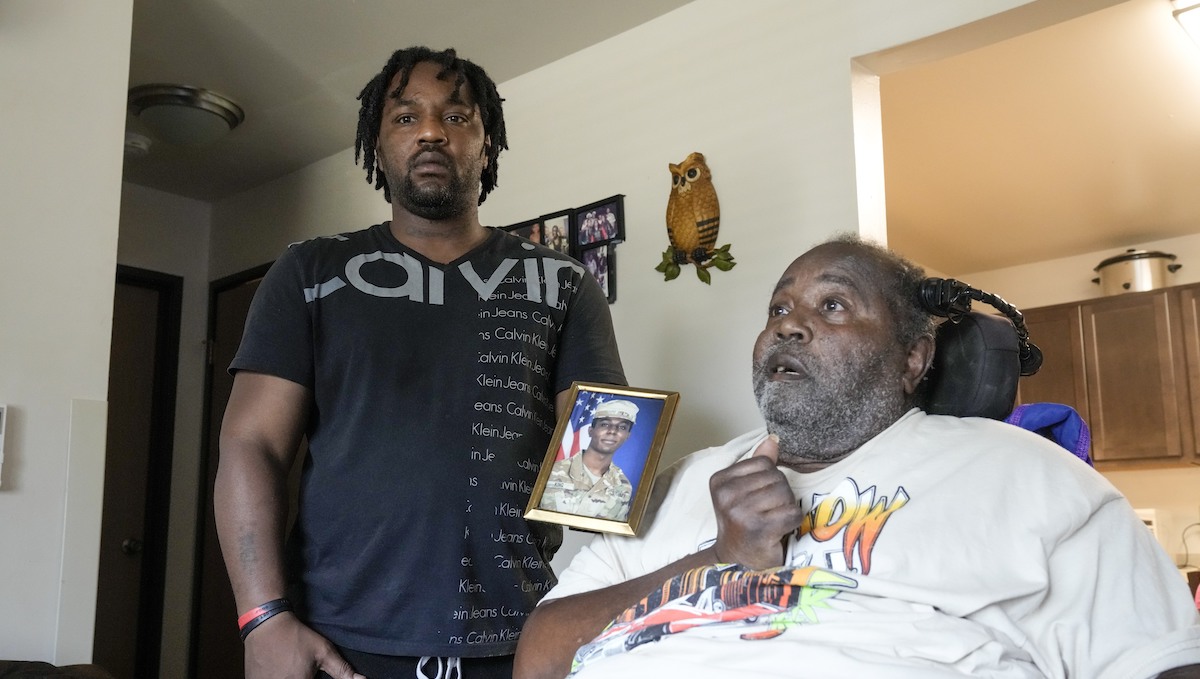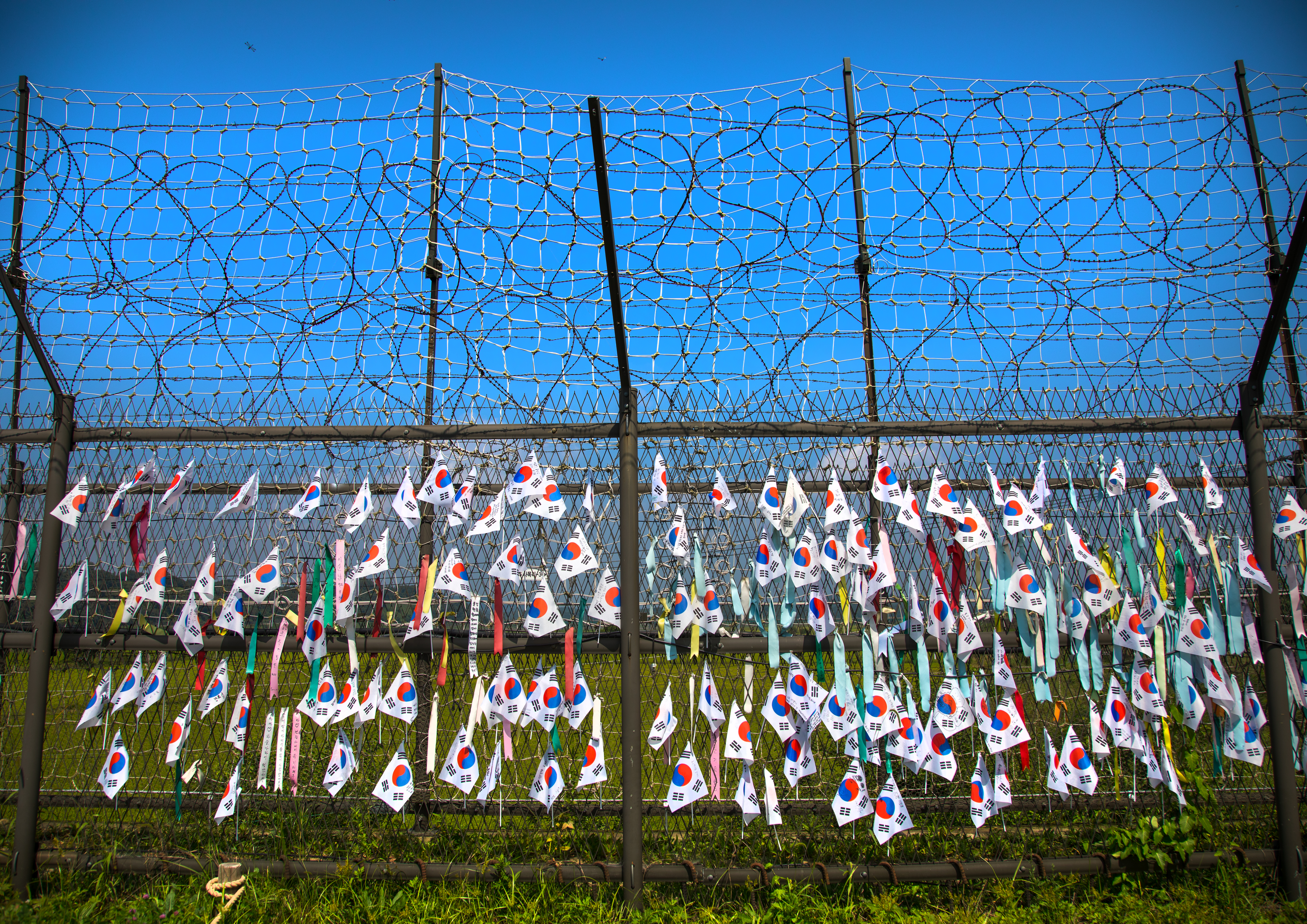
The White House on Thursday expressed deep concern about the well-being of a U.S. soldier who bolted across the heavily armed North Korea border earlier this week as North Korean officials have yet to respond to U.S. requests for basic information about the AWOL soldier.
The history of rough treatment of Americans detained by North Koreans — including the 2017 death of a 22-year-old student after he was flown home in a vegetative state after 17 months in captivity — is top of mind as U.S. officials seek answers about Pvt. Travis King.
“This is not a country that is known for humane treatment of Americans or actually anybody else for that matter,” White House National Security Council spokesman John Kirby said. “We don't know where he is. We don’t know the conditions in which he’s living right now. And it’s the not knowing that is deeply concerning to us and we’re trying as best we can to get as much information as we can about him.”
Without mentioning the soldier, North Korea's defense minister issued a veiled threat Thursday, suggesting the docking of a nuclear-armed U.S. submarine in South Korea could be grounds for a nuclear attack by the North. North Korea has used such rhetoric before, but the latest threat could signal just how strained ties are right now.
Get Tri-state area news delivered to your inbox.> Sign up for NBC New York's News Headlines newsletter.
King, who was supposed to be on his way to Fort Bliss, Texas, after finishing a prison sentence in South Korea for assault, ran into North Korea while on a civilian tour of the border village of Panmunjom on Tuesday. He is the first known American held in North Korea in nearly five years.
According to a U.S. official, King — who chose to serve his time at a labor camp rather than pay the nearly $4,000 fine — has been declared AWOL. The punishment for being away without leave can include confinement in the brig, forfeiture of pay or dishonorable discharge and it is largely based on how long they were away and whether they were apprehended or returned on their own. The official spoke on condition of anonymity to discuss a sensitive matter.
King, 23, has not been declared a deserter, which is a far more serious offense. Often the military waits for a period of time to see if a service member returns, but that is very uncertain in this case. Desertion can result in imprisonment of as much as three years, and — in times of war — can carry the death penalty.
Sabrina Singh, a Pentagon spokeswoman, told reporters on Thursday that King was not escorted all the way to the gate because he was not in custody and there was no anticipation that he would not get on the plane to go home.
Military personnel escorted him to the passport control area and were not allowed to go farther than that. Singh said he confirmed to the U.S. military that he was near the gate. King knew he was returning to Texas to face likely discharge.
Asked if King is alive, Singh said the U.S. does not know his health condition.
She said it is “not our assessment” that King represents a security threat or liability, when asked if he had intelligence that North Korea would want. She added that the department has no indication that King’s decision to run into North Korea was pre-planned or organized with Pyongyang.
Asked whether the U.S. feared that King could be mistreated or tortured by the North, Kirby responded that North Korea is a “brutal regime" but that the U.S. is still not in position to confirm how he is being treated.
Otto Warmbier, a University of Virginia student, was seized by North Korean authorities from a tour group in January 2016 and convicted of trying to steal a propaganda poster and sentenced to 15 years of hard labor. He served 17 months before being returned to the U.S. in a vegetative state.
While not providing a clear reason for Warmbier’s brain damage, North Korea denied accusations by Warmbier’s family that he was tortured and insisted it had provided him medical care with “all sincerity.”
The U.S. and North Korea, which fought during the 1950-53 Korean War, are still technically at war since that conflict ended in a truce, not a peace treaty, and have no diplomatic ties. Sweden provided consular services for Americans in past cases, but Swedish diplomatic staff reportedly haven’t returned since North Korea ordered foreigners to leave the country at the start of the COVID-19 pandemic.
The U.S. can also reach North Korea via a hotline at the U.S.-led U.N. Command in Panmunjom — known as the “ pink phone."
The State Department confirmed on Wednesday it has reached out to officials in South Korea and Sweden for help reaching the North Koreans. Jeon Ha-kyu, a spokesperson of South Korea’s Defense Ministry, said Thursday his ministry is sharing information with the American-led U.N. Command in South Korea, without elaborating.
Meanwhile, the North's defense minister, Kang Sun Nam, issued a statement in state media that called a recent U.S. submarine deployment "the most undisguised and direct nuclear threat” to North Korea. He warned the deployment may be one of the situations foreseen in a new law that authorized the preemptive use of nuclear weapons in a broad range of cases.
“The U.S. military side should realize that its nuclear assets have entered extremely dangerous waters,” Kang said.
Some experts still doubt North Korea could use such arms first in the face of superior U.S. and South Korean forces. South Korea’s Defense Ministry on Friday described the deployment of the USS Kentucky and nuclear contingency planning meetings between Washington and Seoul as “defensive response measures” to counter the growing North Korean nuclear threat.
The ministry said in a statement it “strongly warns” that any nuclear attack by the North on the allies would face an “immediate, overwhelming and decisive response … that would bring an end to the North Korean regime.”
Kentucky's deployment, which happened on the day of King's border crossing, was part of U.S. steps to boost its security commitment to the North's rival, South Korea. North Korea later test-fired two missiles.
The tensions could complicate efforts to free King.
“North Korea is not going to ‘catch and release’ a border-crosser. ... However, the Kim regime has little incentive to hold an American citizen very long, as doing so can entail liabilities,” said Leif-Eric Easley, a professor at Ewha University in Seoul.
“For Pyongyang, it makes sense to find a way of extracting some compensation and then expel an American for unauthorized entry into the country before an isolated incident escalates in ways that risk North Korean diplomatic and financial interests,” he said.
Other experts say North Korea won’t likely easily return King as he is a soldier who apparently voluntarily fled to North Korea, though many previous American civilian detainees were released after the United States sent high-profile missions to Pyongyang to secure their freedom.
North Korea has previously held a number of Americans who were arrested for anti-state, espionage and other charges. But no other Americans were known to be detained since North Korea expelled American Bruce Byron Lowrance in 2018. During the Cold War, a small number of U.S. soldiers who fled to North Korea later appeared in North Korean propaganda films.
The motive for King's border crossing is unknown. King’s family members said the soldier may have felt overwhelmed by the legal trouble in South Korea, which could lead to a discharge from the military.
King, who was serving in South Korea as a cavalry scout with the 1st Armored Division, was released earlier this month after 47 days of hard labor in the prison camp. In February, a Seoul court fined him 5 million won ($3,950) after convicting him of assaulting someone and damaging a police vehicle, according to a transcript of the verdict obtained by The Associated Press. The ruling said King had also been accused of punching a man at a Seoul nightclub, though the court dismissed that charge because the victim didn’t want King to be punished.
___
Kim reported from Seoul, South Korea. Associated Press writers Kim Tong-hyung in Seoul, South Korea, Lolita C. Baldor and Matthew Lee in Washington; Scott Bauer in Madison, Wisconsin; and Melissa Winder in Kenosha, Wisconsin, contributed to this report.



